|
|
|
Sort Order |
|
|
|
Items / Page
|
|
|
|
|
|
|
| Srl | Item |
| 1 |
ID:
118003
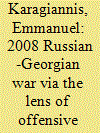

|
|
|
|
|
| Publication |
2013.
|
| Summary/Abstract |
The Russian intervention in Georgia's breakaway republic of South Ossetia in August 2008, Moscow's first-ever use of military force against a sovereign state in the post-cold war period, deserves a theoretical explanation. By following the tenets of Offensive Realism, this article will argue that the US-Russian competition in the South Caucasus is the main cause of the 2008 Russian-Georgian war. During the 1990s, the USA passed the buck to Turkey to contain Russian influence in the South Caucasus. In the early to mid-2000s, however, the Russian-Turkish relations were improved so rapidly that the USA opted, through NATO expansion, to step in as an offshore balancer. Following Bush administration's decision to support the Georgian candidacy for NATO membership and Georgia's ill-fated attempt to seize South Ossetia, Moscow went to war to re-establish hegemony in the South Caucasus. In this way, as the theory of Offensive Realism claims, the Kremlin believes that Russian state will enhance its chances of survival in the anarchical international system.
|
|
|
|
|
|
|
|
|
|
|
|
|
|
|
|
| 2 |
ID:
145769
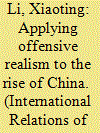

|
|
|
|
|
| Summary/Abstract |
This study employs offensive realism to provide a baseline for assessing Beijing's strategic choices in dealing with regional neighbors. In theory, when an ascending power is not yet capable of dominating its home region, it would strive foremost to prevent external powers from extending their influence in its vicinity. To attain that goal, it will likely adopt a carrots-and-sticks strategy, by rewarding some neighbors and punishing others according to their readiness to accommodate its ascendance and keep a cautious distance from external powers. Empirically, China's management of territorial disputes from the 1950s onward is quite consistent with these theoretical expectations. Viewed in this light, restraint and assertiveness are not inversely related in Chinese foreign policy behavior. Rather, they are two sides of the same coin and serve the same overriding purpose of countering adversarial (especially US) influences in China's neighborhood.
|
|
|
|
|
|
|
|
|
|
|
|
|
|
|
|
| 3 |
ID:
121860
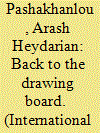

|
|
|
|
|
| Publication |
2013.
|
| Summary/Abstract |
Offensive realism argues that states committed to survive are nevertheless condemned to participate in a relentless struggle for power, and it holds the structure of the international system as the cause of this tragic outcome. This article subjects the logic behind this tragic worldview and the explanatory power of offensive realism to a careful and comprehensive scrutiny. This in-depth analysis of offensive realism amounts to a substantial critique of the theory as it fails to logically generate the brutish world it presupposes and is plagued by significant shortcomings in its explanatory model. These findings suggest that offensive realism cannot provide useful theoretical lenses for explaining and understanding international politics, even when it is assessed on its own terms.
|
|
|
|
|
|
|
|
|
|
|
|
|
|
|
|
| 4 |
ID:
074632
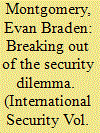

|
|
|
|
|
| Publication |
2006.
|
| Summary/Abstract |
In the debate between offensive and defensive realism, a central issue is whether major powers can overcome the uncertainty that drives the security dilemma. Whereas offensive realists maintain that states cannot know others' motives and intentions, defensive realists argue that states can reveal their preferences by altering their military posture. Defensive realists have, however, presented an incomplete account of the constraints and opportunities associated with military reassurance. To demonstrate its motives, a security-seeking state must take actions that will often increase its vulnerability to potential aggressors. Although offense-defense variables have been invoked to address the constraint of vulnerability, the conditions usually considered most favorable for reassurance-differentiation between offense and defense and an advantage for the latter-make it no easier to achieve. A defensive advantage makes reassurance difªcult by encouraging all states to adopt defensive capabilities and by requiring large concessions to reveal benign motives. Only when offense and defense are differentiated and the balance between them is neutral can states reveal their motives without also endangering their security. These arguments are illustrated with three empirical examples: the Anglo-German naval race, Nikita Khrushchev's troop cuts, and Mikhail Gorbachev's arms limitation and arms control policies.
|
|
|
|
|
|
|
|
|
|
|
|
|
|
|
|
| 5 |
ID:
181320


|
|
|
|
|
| Summary/Abstract |
Many analysts and practitioners argue that the United States should actively engage in geoeconomic competition with China. This article suggests that an argument against this claim can be counter-intuitively derived from offensive realism – an influential international relations theory known for its pessimism on great power relations. Offensive realism suggests that a great power should try to maximize its material capacity and pay careful attention to the balance of material power between major states. It also suggests that a great power should avoid spending its limited resources in influence or legitimacy competition in the peripheries. In this context, offensive realism prescribes that the United States should not actively oppose Chinese economic initiatives unless those projects have meaningful impact on the bilateral balance of power and its security. On the contrary, Washington should encourage China to expand its investments in geoeconomic initiatives since China is likely to end up spending a large amount of its resources in regions that do not have significant implications to the balance of material power. For offensive realists, a great power should take balance of power competition in major regions seriously, not influence competition around the globe. Accordingly, the United States should restrain itself and avoid geoeconomically confronting China.
|
|
|
|
|
|
|
|
|
|
|
|
|
|
|
|
| 6 |
ID:
183732
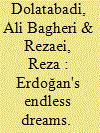

|
|
|
|
|
| Summary/Abstract |
After the Justice and Development Party (AKP) rose to power in 2002, Turkey's Middle East policy underwent a radical change. Erdoğan's readings of the Arab Spring events are a vivid example of Turkey's new foreign policy. In the last months of 2019 and 2020, Turkey took two other important steps that have attracted the attention of the international community: engagement in Operation Peace Spring in northern Syria without UN Security Council authorization, and steps to reach an agreement with the Libyan government on oil and gas exploration in the Mediterranean in tandem with sending troops to Libya. Turkey's recent actions, which violate international law and UN resolutions, raise several questions: what changes have taken place in Turkey's foreign policy? What are its core drivers and main components? And what results will the new policy deliver in the future? We argue that Turkey's behavior conforms to the principles of offensive realism. The shift in Turkey's foreign policy and the trend toward offensive realism are rooted in the 2011 Arab Spring and subsequent events in the Middle East. The failed coup of 2016 accelerated these changes and pushed them in new directions. Turkey is now seriously aiming to maximize its power, particularly in the politico-military field, which could increase tensions in the sensitive region. We submit that Turkey cannot be guided by offensive realism in the long term, however.
|
|
|
|
|
|
|
|
|
|
|
|
|
|
|
|
| 7 |
ID:
166011


|
|
|
|
|
| Summary/Abstract |
This study analyzes the debate on Pakistan’s nuclear weapons program among the Pakistani elites, who include scientists, strategists and politicians. The study examines the nuclear doctrine that emerges from this, as well as the likely ways in which it can impact peace and stability on the Indian subcontinent. It also underlines the possible inuence of the Pakistani nuclear doctrine on the nuclear doctrine of other “unrecognized” emerging nuclear weapon states such as North Korea. After its creation and independence in August 1947, Pakistan’s elites considered survival to be the primary national strategic objective of the country in the harsh international environment, especially with regards to India. This understanding shaped Pakistan’s security policy in the early years, post August 1947. The three wars Pakistan fought with India proved that the collective security policy and the anti-nuclear weapons advocacy by Pakistani defensive realists was not the best strategy in the prevailing security environment. In this backdrop, the Multan meeting in January 1972 initiated a fierce debate on whether a nuclear weapons program was the best strategy for ensuring national security. The participants included defensive realists, offensive realists, liberals and separatists. The offensive realists won the debate, shaped Pakistan’s nuclear policy, and initiated its nuclear weapons program. Separatists here refer to the sub-nationalist forces that seek political separation from Pakistan.
|
|
|
|
|
|
|
|
|
|
|
|
|
|
|
|
| 8 |
ID:
163260


|
|
|
|
|
| Summary/Abstract |
This article suggests that a powerful defence for open trade can be derived from offensive realism. Offensive realists posit that a state tries to maximize its relative material power in order to protect its security in the dangerous international realm. I argue that with regard to trade, relative power maximizing states have strong incentives to maintain free trade. Mainstream trade theories commonly suggest that an important mechanism through which trade affects a state's material capacity is specialization, which advances trading states' allocative and productive efficiency. When specialization is prioritized, the international trade structure is likely to be composed of multiple players, or be ‘multipolar’, and protectionist states are likely to encounter significant relative losses vis-à-vis other states. In the multipolar trade structure, even when a state is facing relative losses from existing commercial exchanges, employing extensive protectionist policies would weaken the state's relative power as it would incur even larger relative losses. In the offensive realist world where the failure to maximize relative power is dangerous, protectionism needs to be avoided precisely because it does not allow for power maximization. This argument is substantiated by an examination of the United Kingdom's decision to avoid protectionism during the decades leading up to First World War.
|
|
|
|
|
|
|
|
|
|
|
|
|
|
|
|
| 9 |
ID:
095320


|
|
|
|
|
| Publication |
2010.
|
| Summary/Abstract |
I advance an endogenous explanation for the systemic transformation of international politics and offer to neatly resolve the debate between offensive realism and defensive realism through a social evolutionary approach. I contend that international politics has always been an evolutionary system and it has evolved from an offensive realism world to a defensive realism world. Consequently, offensive realism and defensive realism are appropriate grand theories of international politics for two different historical epochs. Different grand theories of international politics are for different epochs of international politics, and different epochs of international politics actually need different theories of international politics. Because international politics has always been an evolutionary system, non-evolutionary approaches will be intrinsically incapable of shedding light on the evolution of the system. The science of international politics must be a genuine evolutionary science and students of international politics must 'give Darwin his due'.
|
|
|
|
|
|
|
|
|
|
|
|
|
|
|
|
| 10 |
ID:
072818


|
|
|
|
|
| Publication |
2005.
|
| Summary/Abstract |
Despite a long legacy of allied relations, former South Korean President Kim Dae Jung decided not to join the American missile defence programmes. President Roh Moo Hyun has chosen to continue this policy. The choice is controversial but generally very popular among the people of South Korea even though North Korea has been at the forefront of global WMD proliferation, developing nuclear weapons and deploying large numbers of long-range ballistic missiles. As a result, a gulf has emerged between American global strategy and South Korean local politics since President George W. Bush opted to develop missile defence to meet North Korea's increasing missiles threats. These rival choices represent one of the clearest clashes between Washington's 'Offensive Realism' and South Korea's 'Wounded Nationalism'. Although missile defence issues have not been a major part of the public dispute, the general atmosphere has direct effects on missile defence diplomacy. Consequently, the issue is a major symbol of the estrangement between the Republic of Korea and the United States.
|
|
|
|
|
|
|
|
|
|
|
|
|
|
|
|
| 11 |
ID:
102450


|
|
|
|
|
| Publication |
2010.
|
| Summary/Abstract |
Many Chinese and Japanese authorities believe Taiwan is essential to their respective states' national security due to the island's geographic centrality and beneficial proximity to nearby and distant sea lanes. Of further importance is Taiwan's immediacy to territorial and resource disputes between China and Japan. This article focuses on the security concerns and strategies of both states and applies realism, its tenets of defensive and offensive realism, and neoliberalism in order to better comprehend those concerns and strategies and also provide probable solutions.
|
|
|
|
|
|
|
|
|
|
|
|
|
|
|
|
| 12 |
ID:
110827
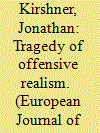

|
|
|
|
|
| Publication |
2012.
|
| Summary/Abstract |
What is the realist position on how to deal with the rise of China? One prominent realist approach, associated with John Mearsheimer, calls for the US to do whatever it can to slow China's rise. However, while this is a realist perspective, it is not the realist perspective. In particular, realist approaches that derive from a classical foundation suggest policies fundamentally different from those favored by Mearsheimer. This article argues that realism should return to some of its classical traditions. It reviews why, from a classical realist perspective, the rise of China must be viewed with alarm, but argues that Mearsheimer's approach - offensive realism - is wrong, and dangerous. Many of these errors are rooted in structuralism; a classical realist approach, which allows for the influence of history and politics, provides greater analytical purchase and wiser policy prescriptions than offensive realism.
|
|
|
|
|
|
|
|
|
|
|
|
|
|
|
|
|
|
|
|
|